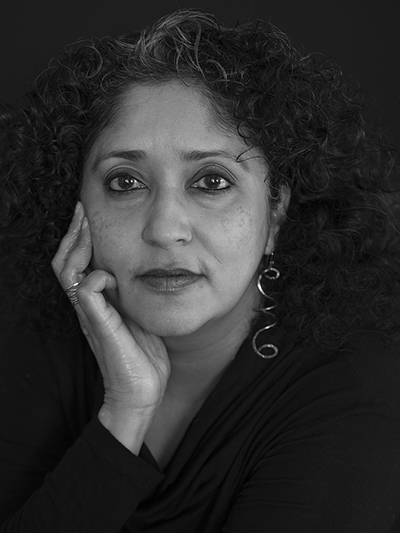Annu Palakunnathu Matthew is professor of art at the University of Rhode Island and director of the URI Center for the Humanities. She is also a Providence-based visual artist recognized for humorous and insightful imagery that often uses existing personal, political and media imagery to collectively construct parallel realities, identities and histories.
Her recent solo exhibitions include the Royal Ontario Museum, Nuit Blanche Toronto and sepiaEYE in New York City. Palakunnathu Matthew has also exhibited her work at the RISD Museum, Newark Art Museum, MFA Boston, San Jose Museum of Art, Museum of Fine Arts in Texas, Victoria & Albert Museum in London, Fotofest Biennial 2018, Guangzhou Photo Biennial 2009 and at The Smithsonian.
Grants and fellowships that have supported her work include a MacColl Johnson, John Guttman, Fulbright Fellowships and grants from the Rhode Island State Council on the Arts.
PBN: URI is one of the 11 initial members of the New England Humanities Consortium. What is the mission of this organization?
PALAKUNNATHU MATTHEW: The consortium, the first of its kind in the region, will promote intellectual collaboration, interdisciplinary exchange and innovative educational programming for faculty, students and the regional, national and global communities we serve. The consortium has an added bonus with a $100,000 grant from The Andrew W. Mellon Foundation.
PBN: Do you feel like humanities studies have gotten a bad rap over the past decade or so, as more students seek to identify a certain, or reliable, career path when determining their studies and feel humanities cannot provide that?
PALAKUNNATHU MATTHEW: With the recent recession and our somewhat failure to speak eloquently about the strengths of the humanities and the skills our students learn, it is understandable why both students and parents looked for a more reliable career path.
But they also did this without necessarily thinking about the skills needed for those same students for jobs in the 21st century. Now that view is changing even at the governor’s office, which talks about the creative workforce where graduating students are more nimble and flexible in their approach to career options.
PBN: Is that assumption fair?
PALAKUNNATHU MATTHEW: We have had a bad rap, but [we] are also partly to blame.
The skills we teach in the humanities – critical thinking, problem-solving, writing, analyzing, written and oral communication – are all skills needed for the jobs that can’t be outsourced or automated. The last decade has created companies [such as] Airbnb and Uber. Today, we have to prepare students for jobs we haven’t even imagined. The humanities provide those transferable skills.
PBN: This year, URI’s Center for the Humanities invited back seven humanities alumni for a “speed dating” session with current humanities students seeking career advice. What was the feedback from this event?
PALAKUNNATHU MATTHEW: This is the fourth year we are doing this event with URI’s Center for Career and Experiential Education.
The feedback each year has been overwhelmingly positive from both humanities majors and non-majors. Here are a few student comments from this year’s student reflections:
“One of the most surprising aspects of this event was that some of the alumni have jobs that are the polar opposite from what they studied. It was interesting and informative to hear about the different options and careers available. In addition to being informative, this event was also reassuring. It gave the feeling that although you may be studying a major that many people believe [doesn’t] have enough career options, there most definitely are options.”
“I thought this was a great program because I am still unsure how I’m going to find work about which I can be passionate. [The alumni] spoke about how important career satisfaction is, and the climbing salaries for liberal arts majors, which appeased my fear that I’m not going to be making enough money in the future.”
PBN: Do you have plans to host another next year?
PALAKUNNATHU MATTHEW: Yes, this annual event will continue until we don’t have to convince students about the strengths of the humanities and their job prospects.
Our event has become a template for other colleges and disciplines. I have also started a similar program in the art and art history department, where I am a professor.
Emily Gowdey-Backus is a staff writer for PBN. You can follow her on Twitter @FlashGowdey or contact her via email, gowdey-backus@pbn.com.











